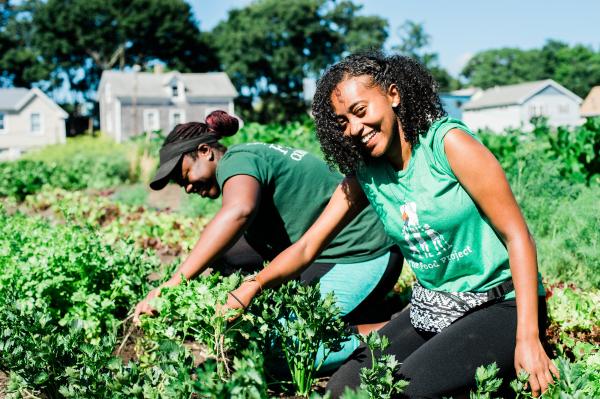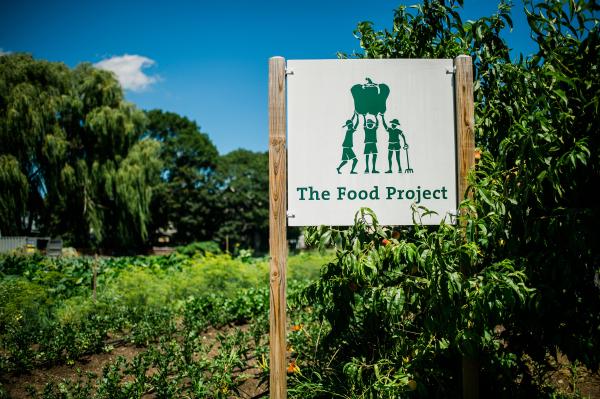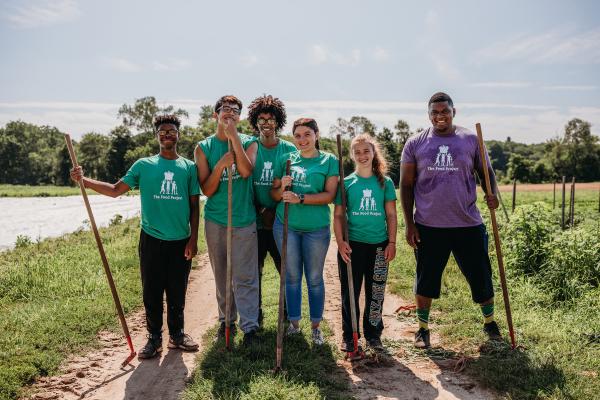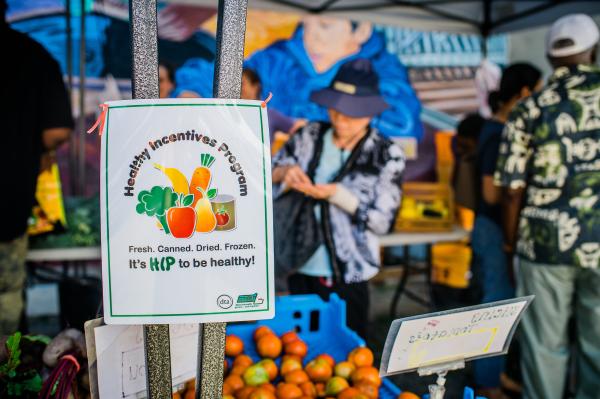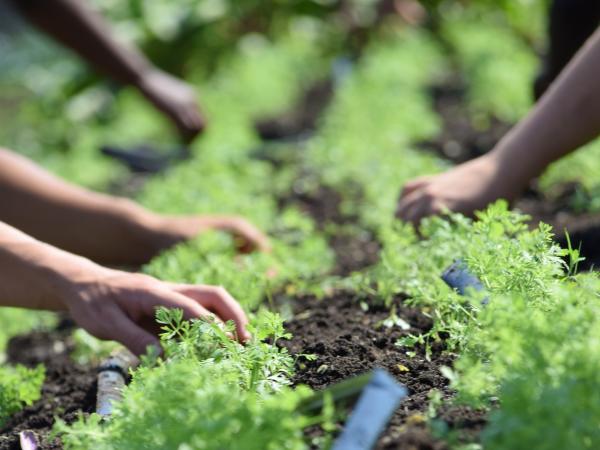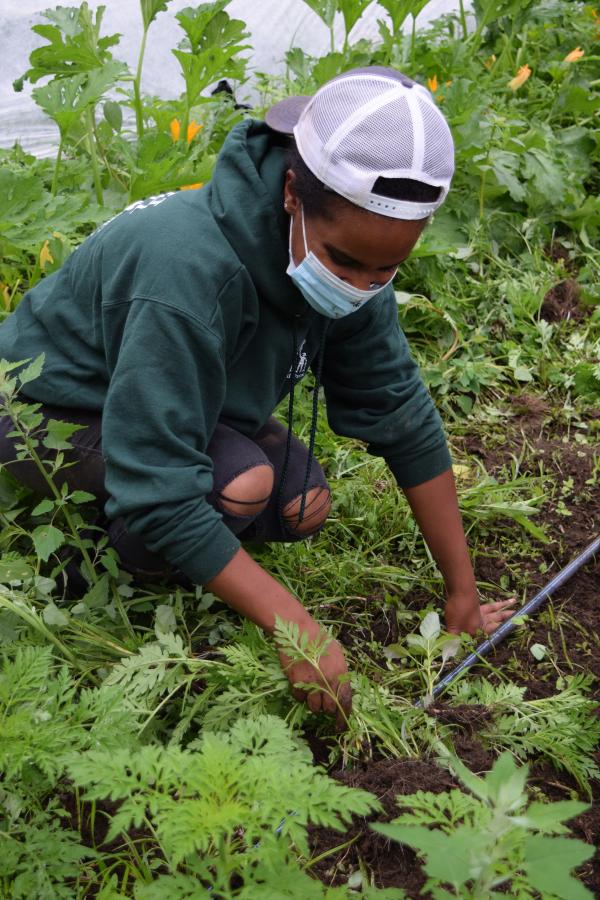Farming for Diversity, Equity, Justice, and Inclusion: A Profile
When Shelburne Farms became the coordinating organization for the Farm-Based Education Network (FBEN), we pledged to listen to, learn from, uplift, and support those doing the important work of farm-based education across the United States and beyond. Over the last few weeks, we’ve hosted peer-to-peer conversations to specifically examine racial justice in farm-based education. We have collectively explored the theme: What does it look like to be farming for diversity, equity, justice, and inclusion? Here is a sampling of reflections from participants, as well as additional questions we have been asking each other.
For the Food Project, one of the founding partners of the FBEN, farming with youth for diversity, equity, justice and inclusion is nothing new. Through our mission to learn from one another, we're proud to feature them here, along with several questions you can use as you consider how their programming can inspire your work -- both in farm-based education and beyond.
The Food Project
“To me, loving land and people is discovering the power of my community. Coming together from diverse backgrounds has allowed us to build friendships that are the foundation of our passion to fight injustices.” - Red H., Youth Crew Member
Farming for Diversity, Equity, Justice, and Inclusion
The Food Project believes that everyone has the right to fresh, healthy, affordable food. Their farms (located in both suburbs and cities) grow more than 250,000 pounds of produce each year. This food is distributed in a variety of ways, including farmers’ markets, donations, Community Supported Agriculture (CSA) shares, and sales to wholesale customers. The majority of that produce is either given to various hunger relief organizations throughout Greater Boston and the North Shore, or sold at a lower than market-rate price at farmers’ markets in Lynn and Boston. In this way, The Food Project is both ensuring that fresh, local food is available to all and it is building a healthy and just food system, one of the tenets for bringing real change to communities.
QUESTION: Do you “shy away from the hard conversations”? Why? What can you do to facilitate and participate in discussions about racial and social justice?
The Food Project’s Roots
In 1991, The Food Project was first imagined by Jeannette and Alan Callahan, a Boston-based Black youth worker and minister respectively and Ward Cheney, a white farmer from Lincoln. Recognizing that young people were disconnected from each other and from the land, these friends and partners envisioned a program that would bring together teenagers from the city and suburbs to learn about farming and social justice, while working for positive change in their communities. The next summer, they hired 20 young people to grow food for local families most in need of fresh, healthy produce. As none of the young people had experience farming, a unique collaboration was forged, where teenagers from starkly different backgrounds were operating from a level playing field. On top of the new and unfamiliar territory of growing food, these teenagers had the opportunity to learn and grow together on common ground, transcending difference through the efforts of weeding a strawberry patch on a hot day and the satisfaction of harvesting carrots for their neighbors.
QUESTION: In what ways do you provide opportunities for young people from starkly different backgrounds to learn and grow together on common ground?
Cultivating Young Leaders
Today, youth remain at the center of The Food Project’s mission and work. In a typical year, The Food Project welcomes over 120 local teenagers representing diverse backgrounds onto 70 acres of sustainably managed farmland through their three-tiered youth development program: Seed Crew, Dirt Crew, and Root Crew. Most teenagers come to The Food Project for their first paid job; and most leave understanding that they have the capacity to have meaningful relationships with people who are different from themselves and hold the power to drive real and relevant change in the world.
Through The Food Project’s introductory summer Seed Crew, youth spend mornings farming in the fields and afternoons in workshops, where they are introduced to the concepts of food justice, identity exploration, and systems of oppression. Graduates of Seed Crew can choose to advance to the academic season Dirt Crew. Working during the school year, Dirt Crew members build garden beds for local residents and lead groups of volunteers on The Food Project’s urban and suburban farms. Sharing their expertise with nascent urban gardeners, Dirt Crew members strengthen an expanding network of fresh food growers, increase healthy food access in low-income neighborhoods, and foster a culture of fresh food consumption for all. Year-round Root Crew members, their most experienced cohort of youth, are at the cutting edge of food system innovation in under-resourced communities—managing affordable, SNAP-accessible farmers’ markets, and collaborating with residents to help imagine and create local infrastructure for affordable fresh food distribution. Their work places an emphasis on increasing neighborhood food production and building Win/Win distribution solutions that equally benefit fresh food consumers and local farmers.
QUESTION: Youth hold the power to drive real and relevant change in the world. In what ways do they learn and practice this in your program?
Fresh Food as a Right
QUESTION: When working with a food insecure population, how are you learning about community members interests, skills, and knowledge so residents are more than a statistic on a page?
Working Together for Change
QUESTION: When putting down roots within a community, are you committed to understanding the ways systemic racism and income inequality impacts the people who live there, and participate in your programs?
The Food Project in 2020
QUESTION: How are you adjusting this season to meet rising food insecurity in your community?
Learn more about The Food Project
- Sign up to receive news from The Food Project.
- Visit their website: www.thefoodproject.org
- Follow them on Facebook: @thefoodproject
- Follow them on Instagram: @the_food_project

